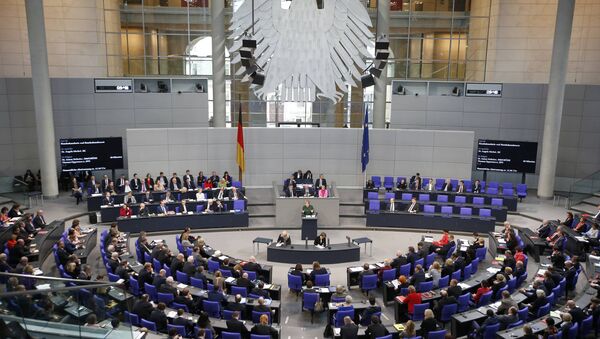Sputnik spoke with Patricia Hogwood, Reader in European Politics at the University Of Westminster to hear more about the situation.
Sputnik: What does the new coalition deal entail?
Patricia Hogwood: There are two strands to the coalition deal. There’s an agreed distribution of cabinet positions, and there’s the coalition agreement which is the detailed policy statement that will form the basis of the government’s work in the next four years.
Most of the criticism of the coalition deal that you see tends to focus on one or the other, but I think that to understand the deal you really have to look at both together. Although the SPD seems to have got the better deal on the distribution of cabinet positions, there are some problems they may encounter in dealing with the ministries over the next four years. There’s a strong argument for saying the CDU has a better deal regarding the policy positions that have been developed so far in the coalition agreement. Merkel has been heavily criticised over the distribution of the cabinet posts because she’s given away one more major post to the SFD, than would usually be considered appropriate. Overall the CDU has taken six posts, the chancellor, economics, agriculture, education, defence and health.
The SPD has also got six ministries, finance and vice chancellor; however the chosen minister from the SPD may struggle to assert their self against the economics minister. They have the foreign ministry, but in practise German foreign policy doesn’t extend much further than beyond the EU. The EU has traditionally popular in Germany, but now since Brexit people have begun to question whether they are paying too much into Europe and what the future of Europe is. When this deal was made; Martin Schulz, a European expert was leader of the SPD, but now he’s dropped out of the party leadership, it’s potentially a bit of a booby trap. They’ve also got work and welfare, which they really wanted as they want to deliver on promises they made to the public during their election campaign.
The conditions in the coalition however, are not promising in terms of promoting reform. They have justice, consumer protection, environment and family. Although they seem to have a lot of important ministries, there could be many problems for them in the near future. The right wing CSU has also taken change of immigration, which may worry liberals who are sceptical about the possible policies that could be implemented by the party.
Sputnik: How long do you believe Merkel will remain in power?
Patricia Hogwood: I think she’ll remain in power as long as she wants. She’s kept herself in power very successfully since 2005, through side-lining any opponents that have come up within the party. Now she seems to have designated Annegret Kramp-Karrenbauer; the new, young general secretary as her successor. Nobody will confirm that, but it looks like she’s being trained to be a new Merkel. She tends to follow the same policy preferences as Merkel, the only problem with her is, that she doesn’t really have a public profile at the moment. Having given the finance ministry over to the SPD, there’s no room for Merkel to give Kramp-Karrenbauer this role, but this is really the only question against her name.
Merkel will probably stay in power for at least the first couple of years of the four year coalition, then she will begin to make it clear who will be the next chancellor candidate, however Merkel has surprised us before, so it’s hard to tell for sure at this moment.
The views and opinions expressed by Patricia Hogwood are those of the contributor and do not necessarily reflect those of Sputnik.



